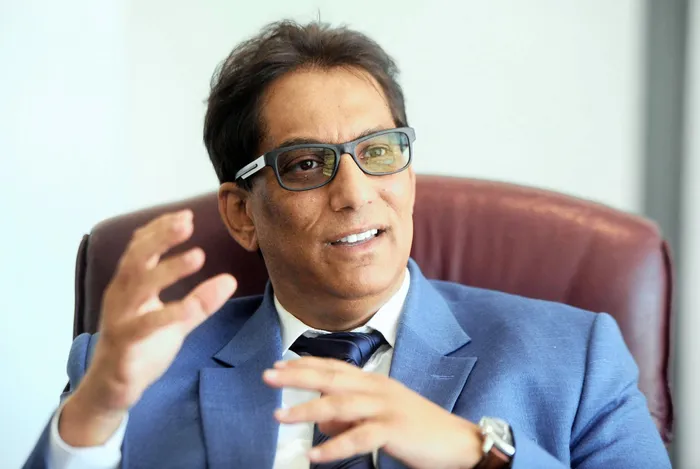Cold War-type intimidation beggars belief

This past week, we have learned with dismay how intimidation tactics have been meted out against the executive chairman of Sekunjalo Investment Holdings, Dr Iqbal Survé, and other executives and employees of Sekunjalo-associated companies. File picture: Ayanda Ndamane /African News Agency (ANA) This past week, we have learned with dismay how intimidation tactics have been meted out against the executive chairman of Sekunjalo Investment Holdings, Dr Iqbal Survé, and other executives and employees of Sekunjalo-associated companies. File picture: Ayanda Ndamane /African News Agency (ANA)
This past week, we have learned with utter shock and dismay how intimidation tactics reminiscent of the Cold War and pre-democracy in South Africa have been meted out against the executive chairman of Sekunjalo Investment Holdings (Sekunjalo), Dr Iqbal Survé, and other executives and employees of Sekunjalo-associated companies.
The past few days could very well have been taken from the pages of a thriller or a Hollywood blockbuster, as news broke of the bugging of
cellular devices belonging to executives of Sekunjalo, Ayo Technology Solutions, AEEI and Independent Media.
Also, it was discovered that several offices of some of the subsidiaries had sophisticated listening devices installed in them - corporate espionage.
Over several articles, my colleagues and I have hypothesised as to why the dirty tricks campaigns have dogged certain publications over the years, all targeting Dr Survé and Independent Media.
It seems fairly certain now that there is a bitter battle happening for the soul of Sekunjalo, South Africa’s beacon of transformation in an economic system that continues to marginalise the black majority.
However, what has unfolded over the past two to three months is an entirely different level, even beyond the unauthorised and wholly unnecessary raid on Sekunjalo’s offices by the Financial Sector Conduct Authority.
Several organisations have voluntarily come out and called for urgent investigation into the recent events, including the Information Communication Technology Union and the ANC, who have urged that those behind the attacks on Dr Survé be dealt with swiftly.
Speaking to the media at the post-national executive committee briefing at Luthuli House last week, ANC secretary-general, Ace Magashule, said: “This is uncalled for. The perpetrators must be brought to book. We are saying to South Africans, this is the time to unite and build a South Africa for all.”
Being a media owner is risky business, wherever in the world you might find yourself.
In South Africa, that risk is amplified by the fact that even after more than two decades of democracy, there are still those who appear unable to accept that South Africa can have a different story to tell, or those who stand to lose out, big time, if a different truth is revealed.
It is under these circumstances that Independent Media’s chairman now finds himself.
While many have come out in support of the beleaguered businessman, who since assuming ownership of the country’s largest newspaper group in 2013 has been beset with an uphill battle to transform the legacy publisher, there are those whose silence is deafening.
The South African National Editors’ Forum (Sanef), whose role it is to protect its members and uphold the freedom of the press, has in the past been criticised for being perceived to defend the status quo and not having the best interests of differing voices in the media at heart.
Sanef have yet to respond and provide any explanation as to why they have not condemned the attacks on Independent Media initially.
Questions were put to Sanef on why they had been silent.
In a response to questions, the organisation’s executive director, Kate Skinner, said that Sanef, as an organisation of editors and journalists, would always condemn attacks on journalists in South Africa and the world, including those of Independent Media.
Sanef’s role is well documented in society through its statements and comments.
“We wish to state categorically that any allegations and evidence of intimidation of journalists, business executives or of activities prejudicial to the health and safety of any citizen should be reported to the police,” said Skinner.
“On the allegations of espionage and listening devices and the threat to life, Sanef believes that these matters should also be reported to law enforcement authorities immediately for proper investigation and prosecution of people responsible.
“We hope that Dr Iqbal Survé, the chairman of Independent Media, has notified the SAPS regarding the safety of his family and we are confident that the authorities will give this matter the highest priority and attention it deserves.”
Skinner further stated: “While we understand that Independent Media editors and senior journalists are not allowed to be members of Sanef, this organisation does not discriminate against them.
“We invite them when we engage the Presidency, and we also do not shy away from standing up for them on matters that infringe on their liberties to do their work without fear or favour. Should they wish to re-join Sanef, we would be more than happy to engage them.”
While Skinner’s response is appreciated, it is not true that Independent Media journalists and editors are not allowed to be part of Sanef. There are a number of editors within the group who are members of the organisation.
It has also been confirmed in a number of news articles published on Independent Media’s platforms that all matters have been reported to the law enforcement authorities and they are being dealt with at the highest level and have been expedited.
* Ayanda Mdluli is a content editor at Independent Media.
Related Topics: